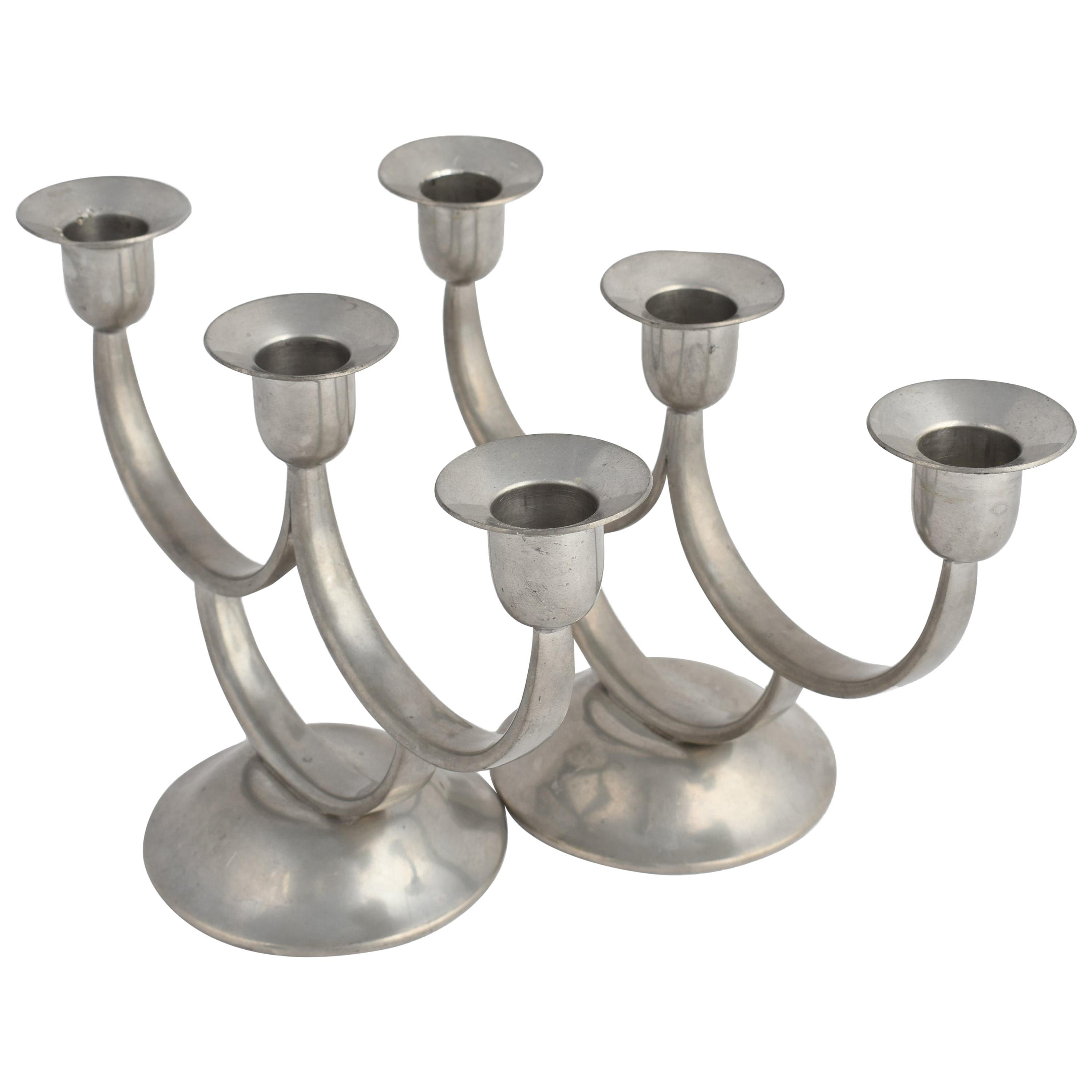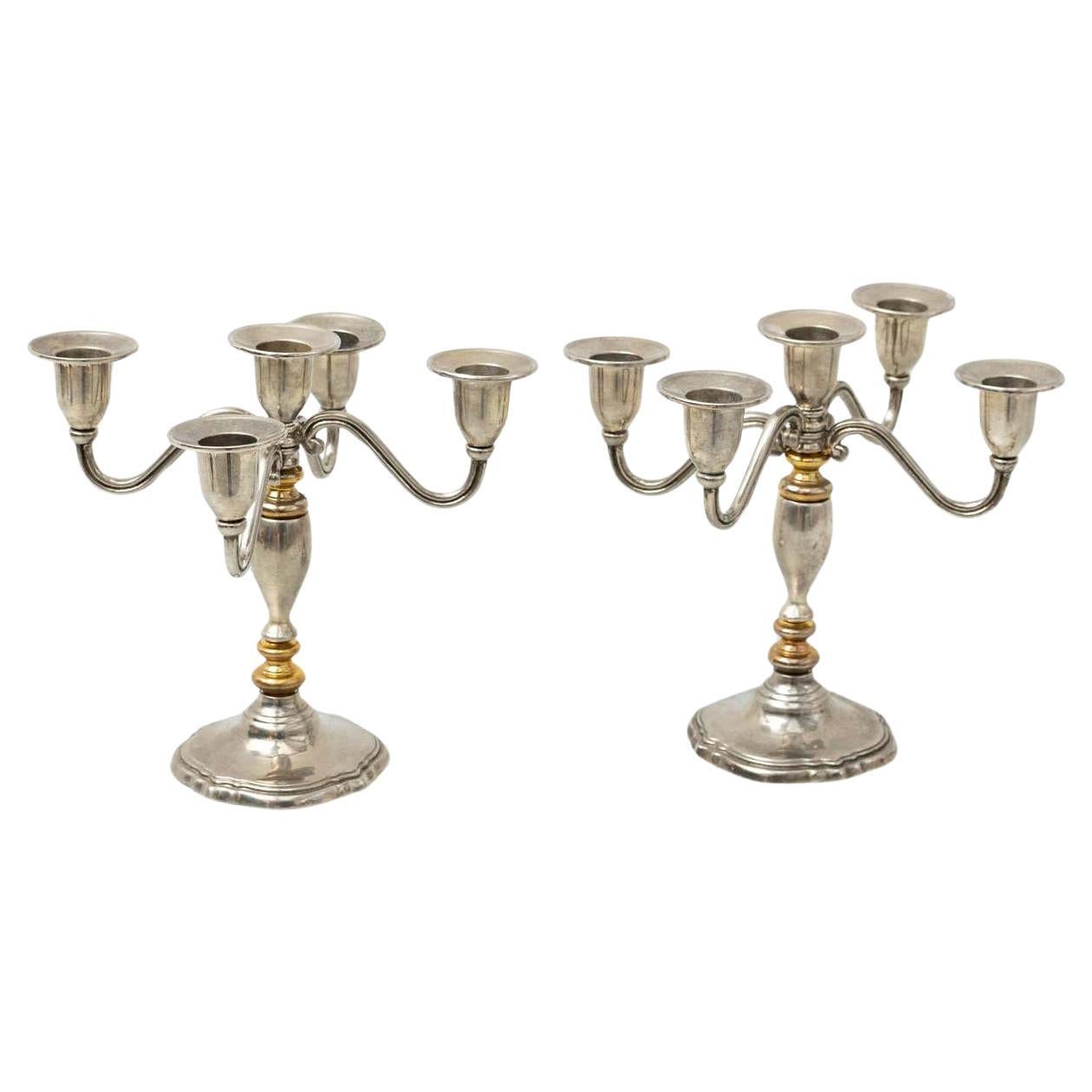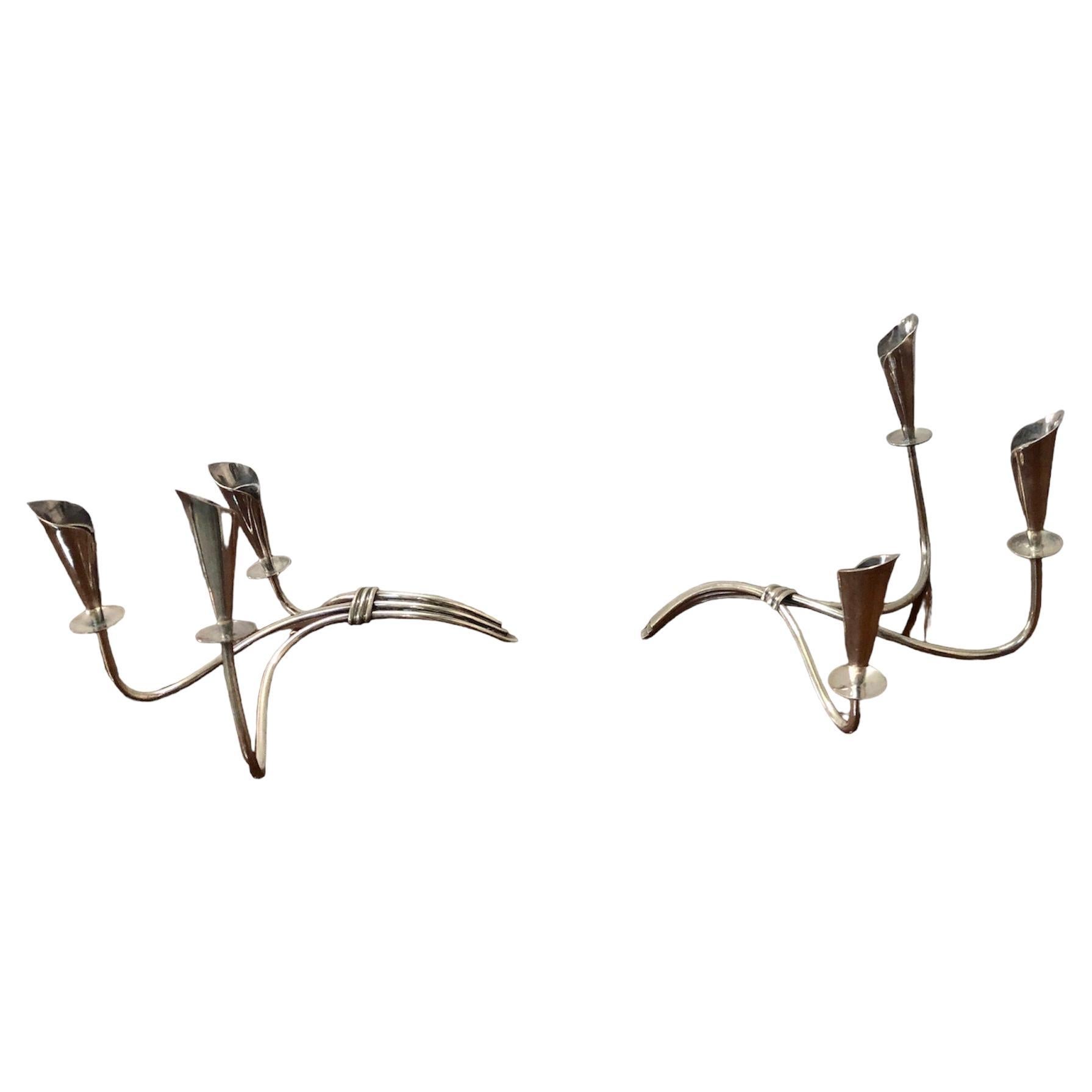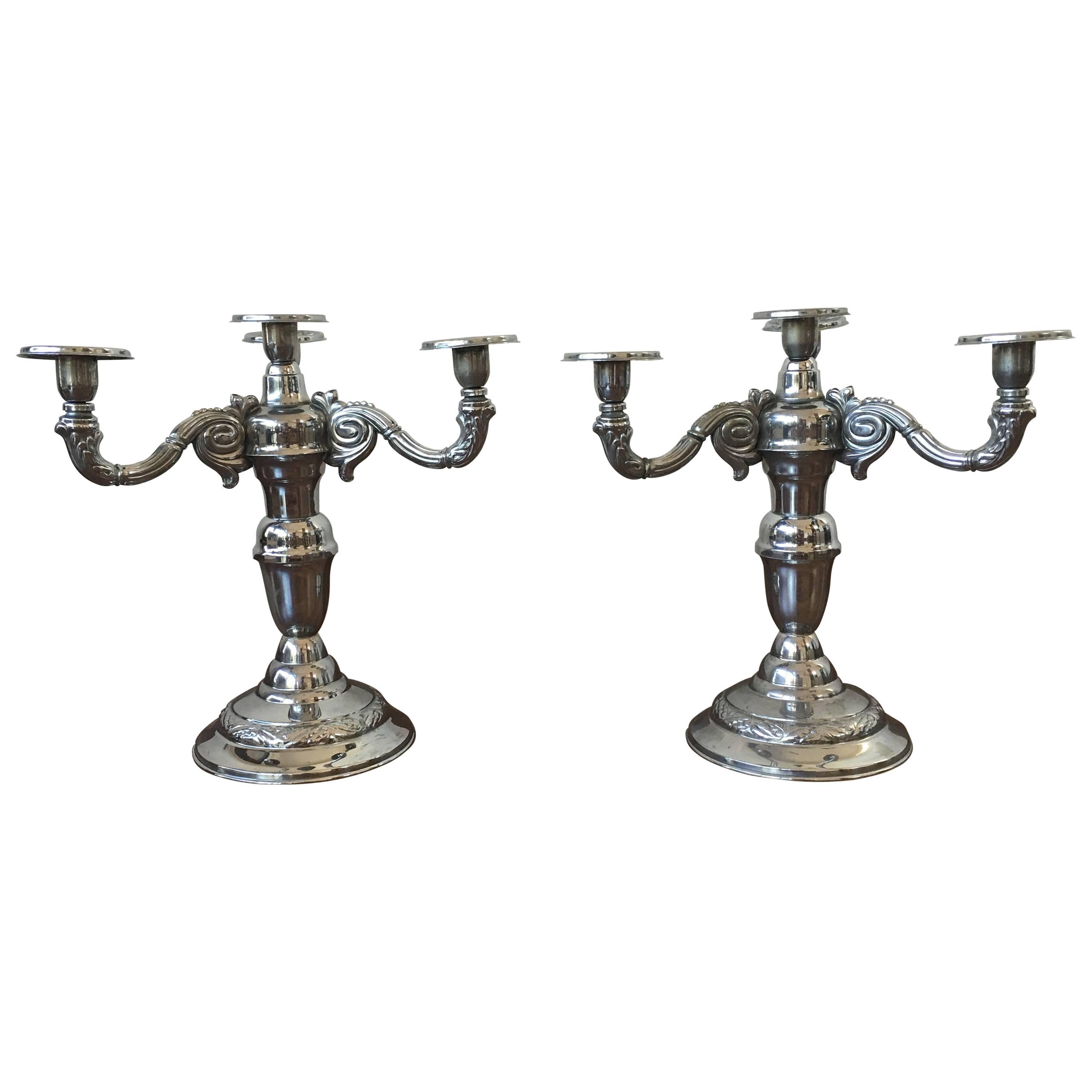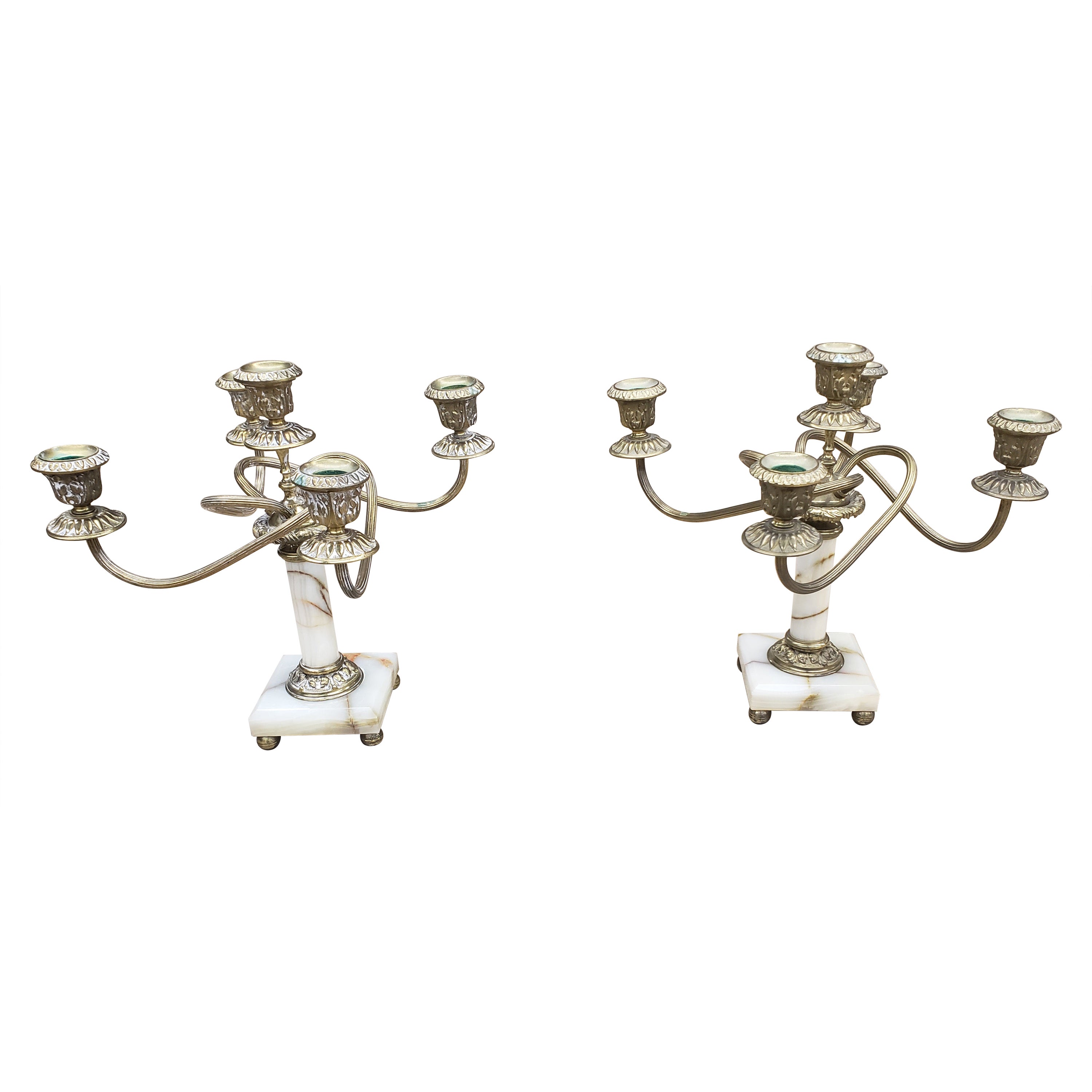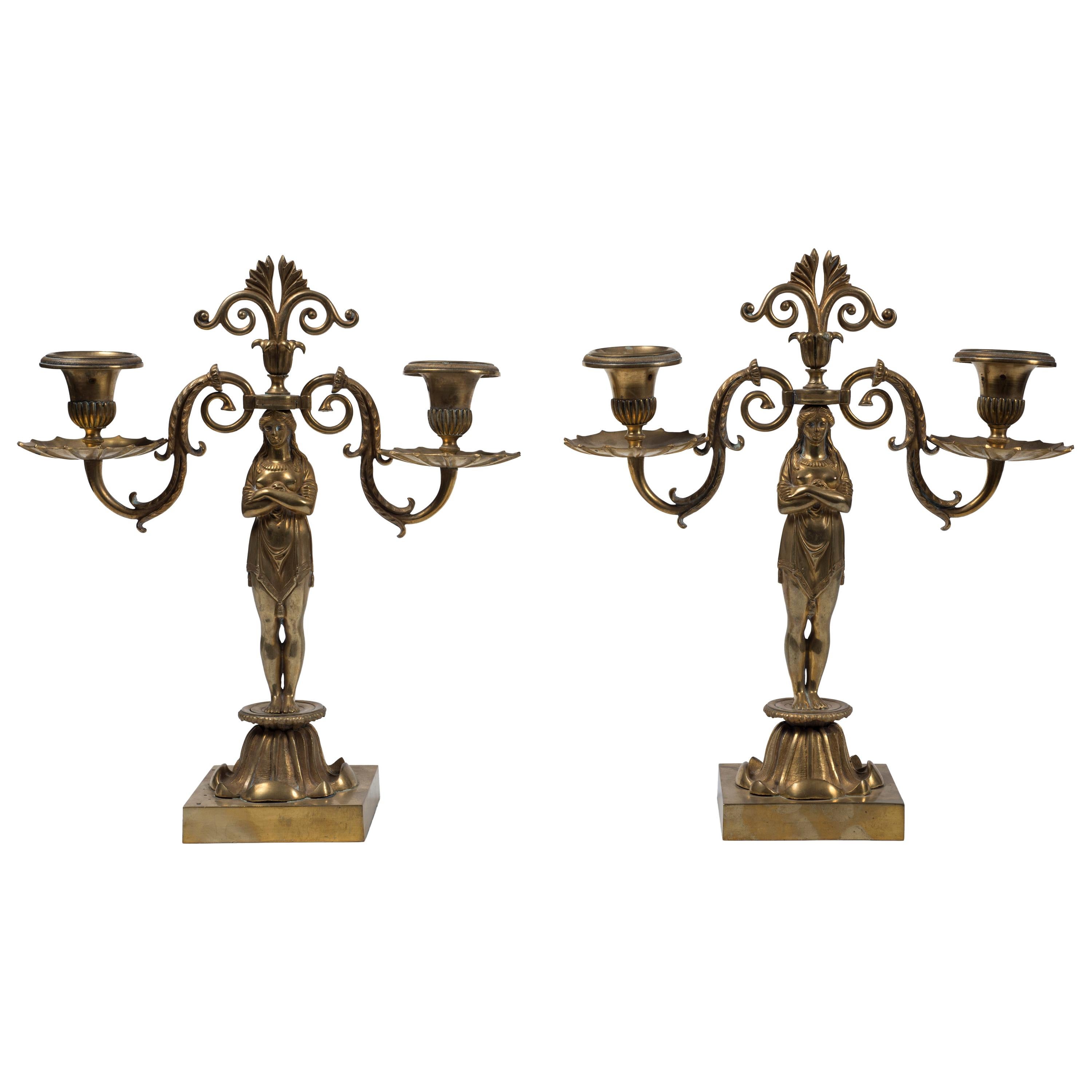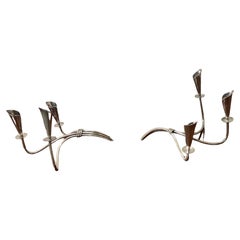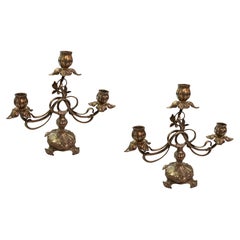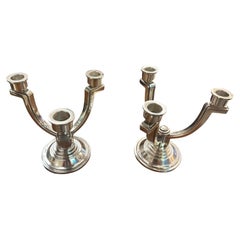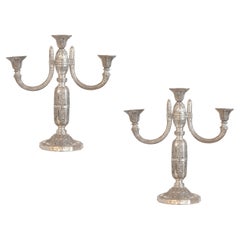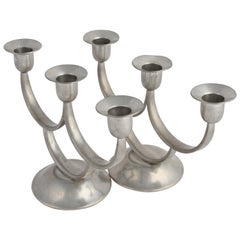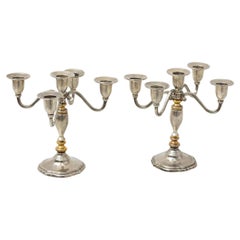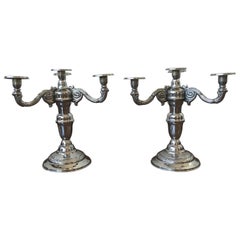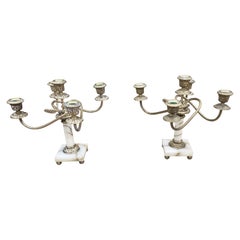Items Similar to Big Pair of Candelabras, 1955, Germany
Video Loading
Want more images or videos?
Request additional images or videos from the seller
1 of 17
Big Pair of Candelabras, 1955, Germany
$16,000
£12,068.13
€13,938.81
CA$22,417.10
A$24,926.53
CHF 13,049.49
MX$304,482.24
NOK 163,979.69
SEK 154,255.76
DKK 104,052.29
About the Item
Sign:
Hutschenreuther
Selb
LHS
Kunstabteilung
-------------------
Hutschenreuther
Kunstabteilung
1722/1 Selb
--------------------------------------
The Hutschenreuther porcelain factory started production in 1814. It was established by Carolus Magnus Hutschenreuther in Bavarian town Hohenburg an der Eger. He employed artists craftsmen and sculptors from all over continental Europe. Hutschenreuther focused on quality and design.
Hutschenreuther from Selb started producing porcelain figurines in 1917 thanks to buying the art division of Paul Muller. The company continued acquisitions buying other German porcelain makers: Altrohlau, Arzburg and Tirschenreuth, Königszelt,Silesia. In 1969 even assets of Hohenburg Hutschenreuther factory were bought. The company was renamed Porzellanfabriken Lorenz Hutschenreuther AG Selb.
We have specialized in the sale of Art Deco and Art Nouveau and Vintage styles since 1982. If you have any questions we are at your disposal.
Pushing the button that reads 'View All From Seller'. And you can see more objects to the style for sale.
Art. Nouveau
The name "Art Nouveau" in French means "new art". It is also known as Jugendstil in Germany. In contrast, in Vienna and in Italy, "Liberty style". The Art Nouveau designs used curvilinear sinuous asymmetrical lines, often based on plant forms. and feminine silhouettes. The style was used in architecture, interior design, glass, jewelry, sculpture, painting, posters and illustration. Introduced new materials such as opals and semi-precious stones Art Nouveau had its greatest impetus in the 1900 Universal Exhibition in Paris. After that, it spread throughout Europe, USA and Australia In Paris you can see the entries in metro are of Hector Guimard and Émile Gallé. Some artists are: Gustav Klimt, Charles Rennie Mackintosh, Alphonse Mucha, René Lalique, Antoni Gaudí and Louis Comfort Tiffany. Victor Horta had a decisive impact on architecture in Belgium. Each of them interpreted it their way.
Why are there so many antiques in Argentina?
In the 1880 – 1940 there was a grate wave of immigration encouraged by the periods of war that were taking place.
1st World War took place between 1914 and 1918
2nd World War took place between 1939 and 1945
The immigrants options were New York or Buenos Aires. Tickets were cheap and in Buenos Aires they were welcomed with open arms, as it was a country where everything was still to be done.
Argentina was the country of new opportunities, labour was needed and religious freedom was assured, in many cases the of the family travel first until they were settled and then the rest of the family members join them.
In the immigrant museum “Ellis Island Immigrant Building” in New York you can se the promotional posters of the boats that would take them to a new life.
Between the years 1895 and 1896, Argentina had the highest DGP (gross domestic product) per capita in the world according to the Maddison Historical Statistics index, this situation arose due to the large amount of food being exported to European countries, which were at war.
The Argentinean ships left the port of Buenos Aires with food, but they returned with furniture, clothes and construction elements, (it´s common to see this the old buildings of the historic neighbourhood of San Telmo, the beams with the inscription “Made in England)”, as well as many markets that were built in Buenos Aires, such us the San Telmo Market, whose structure was brought by ship and afterwards assembled in 900 Defensa Street.
With the great influence of European immigrants living in the country, the children of the upper classes travelled to study in France, resulting in the inauguration of “La Maison Argentinienne”, on 27th of June 1928, in the international city of Paris, which hosted many Argentinians that were studying in Frace.
It´s the fourth house to be built after France, Canada and Belgium, being the first Spanish-speaking one. Still in place today (17 Bd Jourdan, 75014, Paris, France). Many of the children of these wealthy families who attended international art exhibitions, museums and art courses abroad, took a keen interest in the European style. This is why Buenos Aires was at the time referred as “The Paris of South America”.
Between the years 1890 and 1920 more than a hundred Palaces were built on Alvear Avenue the most exclusive avenue in Buenos Aires. Today some of these palaces have been transformed into museums, hotels and embassies.
In the year 1936, the Kavanagh building was inaugurated, it was the tallest reinforced concrete building in South America.
During 1994 the American Society of Civil Engineers distinguished it as an “international engineering milestone”, and it´s now considered a World Heritage of Modern Architecture.
At the time was common to hire foreign architects such as Le Corbusier, who visited Buenos Aires/Argentina in 1929 and in 1948 he drew up the blueprints for a house built in La Plata City (which was declared a World Heritage Site).
In 1947, the Hungarian architect Marcelo Breuer designed “Parador Ariston” in the seaside city of Mar del Plata. After an Argentinean student at Harvard University convinced him to come to Argentina. He worked on an urban development project in the Casa Amarilla, area of La Boca.
The Ukrainian architect, Vladimiro Acosta, arrives in Argentina in 1928 and worked as an architect until que moved to Brazil.
Antonio Bonet, a Spanish architect who worked with Le Corbusier in Paris, arrives in Argentina in 1937, where he carried out several architectural works and in 1938 designs the well-known BFK chair.
Andres Kálnay, of Hungarian origin, made around 120 architectural masterpieces, among which the former Munich brewery stands out, he even made the furniture’s design.
The German architect, Walter Gropius, director of the Bauhaus, lived in Argentina, where he wrote articles for “Sur” magazine and founded in Buenos Aires, an architectural firm with Franz Möller, who was also an architect, where he built two houses.
At the same time several famous designers decided to immigrate to Argentina, among them we can find the well-known French designer, Jean-Michel Frank, who arrived in the country in 1940 and also worked for the Rockefeller family.
Special pieces were made, which were sold exclusively in the country, such as the well-known German company “WMF”, who sold their products by catalogue, which were chosen by the ladies of high society in the list of wedding gifts, as well as the pieces designed by Christofle.
The Swiss sculptor Alberto Giacometti, made special pieces for Argentinean mansions.
In 1904 the first Jansen branch outside Paris was established in Buenos Aires, as the Argentinean clientele demanded a large amount of furniture, from the end of the 19th century to the mid-20th century.
In 1970, the brand Rigolleau Argentina made pieces authorised by Lalique.
The brands Maple and Thompson also set up shop in the country.
The French plastic artist, Marcel Duchamp moved to Argentina in 1918-1919.
Glass signed Gallé, Charder, Leverre, Schneider, Muller and other French firms. They were bought in flower shops and were given to ladies with beautiful floral arrangements.
Some furniture manufacturers travelled to international fairs and bough the patterns to produce the furniture in Argentina, such as the furniture firm Englander and Bonta, who bought the patterns ins Italy.
It is worth mentioning that in Argentina we have the largest community of Italians outside of Italy, as it is estimated that 70 percent of the inhabitants have at least one Italian descendant, followed by Spanish immigrants.
The most Important furniture stores in Argentina:
Comte is founded in 1934 (under the direct management of Jean Michel Frank in 1940).
Nordiska (Swedish company established in 1934).
Churba in 1960, a company that brought foreign designers to present their furniture in the country:
Denmark: (Arne Jacobsen, Finn Juhl, Bender Madsen, Ejner Larsen, Poul Kjaerholm, Hans Wegner)
Sweden: (Hans Agne Jakobsson, Gustavsberg)
United States: (Herman Miller)
Finland: (Lisa Johansson, Folke Arstrom, Tapio Wirkkala, Alvar Aalto, Timo Sarpaneva)
Swedish Factory: (Orrefors)
Italy: (Littala, Vico Magistretti, Emma Gismondi, Gae Aulenti, Angelo Mangiarotti, Elio Martinelli, Gianna Celada, Angelo Mangiarotti, Mario Bellini, Carlo Scarpa)
Finland: (Olivia Toikka)
Plata Lappas (Lappas Silver): a goldsmith shop founded in 1887 in Argentina by Alcibiades Lappas of Greek origin.
In 2019, in Argentina took place “the Art Deco world congress”, in which we participated as hosts invited by Geo Darder, founder of the Copperbridge – Foundation, in which prominent people from all over the world attended to learn about Art Deco in Argentina.
Argentina currently has more than 100 Art Deco buildings and another 90 Art Nouveau buildings throughout the city of Buenos Aires.
Argentina is a country that has not been involved in many wars, which is why it has been a refuge for works of art and antiques from different periods of time, unlike European countries. That is way many collectors, museums and antique dealers from all over the world visit it, you should not miss the opportunity to visit this great country.
Laura Guevara Kjuder, architect.
- Dimensions:Height: 10.63 in (27 cm)Width: 18.51 in (47 cm)Depth: 4.53 in (11.5 cm)
- Style:Mid-Century Modern (Of the Period)
- Materials and Techniques:
- Place of Origin:
- Period:
- Date of Manufacture:1955
- Condition:Wear consistent with age and use.
- Seller Location:Ciudad Autónoma Buenos Aires, AR
- Reference Number:Seller: C-361stDibs: LU6785234441872
About the Seller
5.0
Vetted Professional Seller
Every seller passes strict standards for authenticity and reliability
Established in 1982
1stDibs seller since 2022
37 sales on 1stDibs
Typical response time: <1 hour
- ShippingRetrieving quote...Shipping from: Ciudad Autónoma Buenos Aires, Argentina
- Return Policy
Authenticity Guarantee
In the unlikely event there’s an issue with an item’s authenticity, contact us within 1 year for a full refund. DetailsMoney-Back Guarantee
If your item is not as described, is damaged in transit, or does not arrive, contact us within 7 days for a full refund. Details24-Hour Cancellation
You have a 24-hour grace period in which to reconsider your purchase, with no questions asked.Vetted Professional Sellers
Our world-class sellers must adhere to strict standards for service and quality, maintaining the integrity of our listings.Price-Match Guarantee
If you find that a seller listed the same item for a lower price elsewhere, we’ll match it.Trusted Global Delivery
Our best-in-class carrier network provides specialized shipping options worldwide, including custom delivery.More From This Seller
View All2 Candlesticks, Denmark, 1960
Located in Ciudad Autónoma Buenos Aires, C
We have specialized in the sale of Art Deco and Art Nouveau and Vintage styles since 1982. If you have any questions we are at your disposal.
Pushing the button that reads 'View All ...
Category
Vintage 1960s Danish Mid-Century Modern Candelabras
Materials
Metal
$3,000 / set
2 Candlesticks, France, 1915
Located in Ciudad Autónoma Buenos Aires, C
Candelabras en silver plated
We have specialized in the sale of Art Deco and Art Nouveau and Vintage styles since 1982. If you have any questions we are at your disposal.
Pushing the...
Category
Vintage 1910s French Art Nouveau Candelabras
Materials
Metal
$8,000 / set
Big Pair of Candelabras, Art Deco, Sign: France
Located in Ciudad Autónoma Buenos Aires, C
Candelabra
Sign: Bafico France
Metal: bronze plated
We have specialized in the sale of Art Deco and Art Nouveau and Vintage styles since 1982.If you have any questions we are at you...
Category
Vintage 1920s French Art Deco Candelabras
Materials
Bronze
$8,000 / set
Pair of Candelabras, Art Deco in Silverplated, 1930
Located in Ciudad Autónoma Buenos Aires, C
Pair of candelabras
Material: Silver plated
We have specialized in the sale of Art Deco and Art Nouveau and Vintage styles since 1982. If you have any questions we are at your di...
Category
Vintage 1930s French Art Deco Candelabras
Materials
Iron
Pair of Candelabras, Jugendstil, Art Nouveau, France
Located in Ciudad Autónoma Buenos Aires, C
Centerplace
Metal: Silver plated
We have specialized in the sale of Art Deco and Art Nouveau and Vintage styles since 1982.If you have any questions we are at your disposal.
Pus...
Category
Antique Early 1900s French Art Nouveau Candelabras
Materials
Metal
$10,000 / set
Big Pair of Candelabras, Jugendstil, Art Nouveau, France, 1900, Sign, Christofle
By Christofle
Located in Ciudad Autónoma Buenos Aires, C
Centerplace, Sign: Christofle
Metal: Silver plated
We have specialized in the sale of Art Deco and Art Nouveau and Vintage styles since 1982.If you have any questions we are at you...
Category
Antique Early 1900s French Art Nouveau Candelabras
Materials
Metal
You May Also Like
Pair of Vintage Candlesticks, Germany, 1950s
Located in Roma, IT
Pair of vintage Art Deco candelabras is a pair of original decorative objects realized in the 1930s.
Designed by Harald Buchrucker; made in Germany.
Original brass objects.
...
Category
Vintage 1960s German Candelabras
Materials
Brass
$450 Sale Price / set
35% Off
Pair of XXth Century Candleholders, circa 1950
Located in Barcelona, ES
Set of two antique candlestick.
By unknown manufacturer from France, circa 1950.
In original condition, with minor wear consistent with age and use, preserving a beautiful patina.
...
Category
Vintage 1950s French Mid-Century Modern Candlesticks
Materials
Metal
$689 Sale Price / set
53% Off
Pair of Four-Armed Art Deco Candlesticks, 1930s-1940s, Sweden
Located in Miami, FL
A pair of four-armed Art Deco candlesticks. 1930s-1940s, Sweden. In very good condition. Unclear stamp.
Category
Antique Late 19th Century European Neoclassical Candelabras
Materials
Alpaca
Pair of Continental Brass and Onyx Five-Arm Candelabra
Located in Germantown, MD
A unique pair of Italian patinated brass and onyx candleholders in
Good vintage condition.Measure 11" in width, 11" in depth and stand 12" tall.
Category
Early 20th Century Italian Mid-Century Modern Candelabras
Materials
Onyx, Brass
Pair of Candelabra, French Manufacture, Second Half of the 20th Century
Located in Roma, IT
Pair of candelabra is a couple of original two lights candelabra shaped as caryatid female body in gilded bronze.
Realized by an anonymous artist in France, in the second half of th...
Category
20th Century French Candelabras
Materials
Bronze
Early and Rare Pair of Candelabras, Just Andersen, Denmark 1930
By Just Andersen
Located in Copenhagen, DK
Just Andersen - Scandinavian modern.
A early and rare pair of pewter candelabras with three arms, Dessin 307, manufactured in Denmark, 1930. The candelabras have very fine decoratio...
Category
Mid-20th Century Danish Scandinavian Modern Candelabras
Materials
Pewter
More Ways To Browse
1955 Living Room
German Boat
Mid Century German Poster
German Bauhaus Posters
Tiffany Germany
Glass Flowers Candelabra
Vintage Glass Flower Holder
Danish Paintings Of The 19th Century
German Plant Stand
Retro Plant Holder
Art Deco Magazine Holder
19th Century European Still Life Paintings
1887 Porcelain
1895 Porcelain
Porcelain Figurines Pair
Gismondi Jewelry
Porcelain England 1920
1940s Tiffany Jewelry
